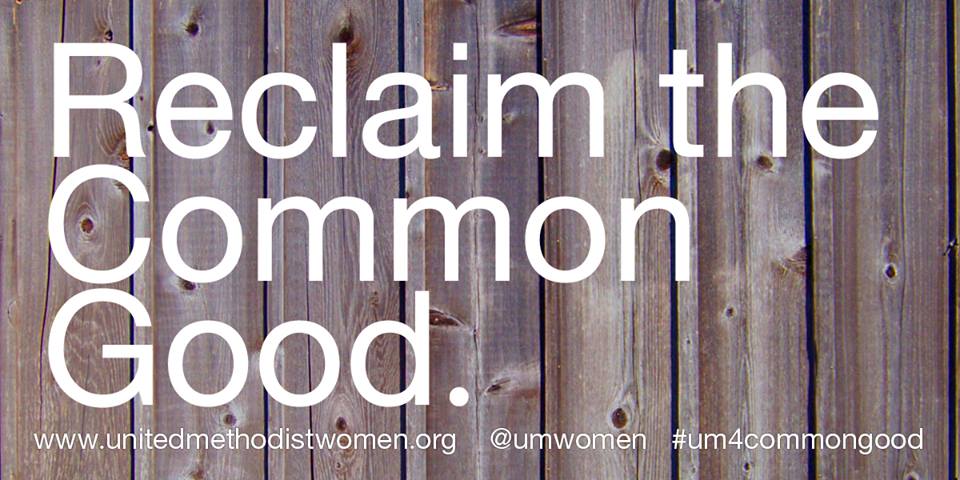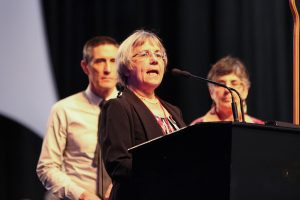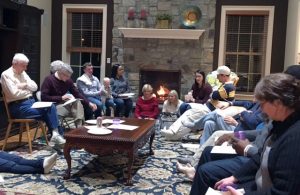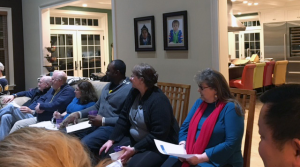
“What makes you hopeful?”
Two dozen Eastern PA United Methodists gathered for dinner and dialogue Feb. 4 to wrestle with that timely question two weeks after the Jan. 20 inauguration of President Donald Trump. They were participating in a momentary movement that has called upon people of conscience and concern to connect with one another in a spirit of Shalom and “Reclaim the Common Good.”

Verna Collver addresses the 2016 Annual Conference during its Act of Repentance, along with the Rev. Gary Jacabella and Sherry Wack, fellow CONAM members. Sabrina Daluisio photo
The group of friends came together to “share food and have a conversation about their hopes and fears for their future in a deeply divided country,” writes Verna Colliver, a member and church librarian of Lansdale UMC, who attended the small gathering.
Five UMC general agencies encouraged members to host or join house parties or church parties on Inauguration Day or a more convenient date. They called for conversations that would “be biblically and theologically grounded, affirm our core Wesleyan values and explore challenges in this moment as they impact our communities and nation.”
The Rev. David Eckert, pastor of Messiah UMC in Lafayette Hill, asked Lara Chang, a member, to consider hosting a group in her home near Plymouth Meeting. She and her husband Ho said yes immediately, realizing the need for honest, casual conversation over a savory dinner, offering food for taste and thought.
With their children at play in another room, the 24 adults of varied ages and backgrounds gathered in a circle, encouraged by Eckert “to talk but also to listen to each other, not debating or trying to prove anyone wrong,” Colliver reports.
 “While the question ‘What makes you hopeful?’ elicited positive responses,” she explains, “most of the group seemed to harbor deep fears for what might lie ahead, as well feeling deep pain caused by the sharp divide within families and churches and among co-workers.” But perhaps while hearing the sound of their children’s voices, the group did find hope in “seeing the younger generation show an openness to engage and get involved in service.”
“While the question ‘What makes you hopeful?’ elicited positive responses,” she explains, “most of the group seemed to harbor deep fears for what might lie ahead, as well feeling deep pain caused by the sharp divide within families and churches and among co-workers.” But perhaps while hearing the sound of their children’s voices, the group did find hope in “seeing the younger generation show an openness to engage and get involved in service.”
Bridging the divide and finding a path to the “common good” will not be realized by one evening of dialogue, Colliver admits, but she says a personal story shared by a younger member of the group may suggest a first step. “She told the group how her father’s words helped her find her way. He taught her to focus on following Jesus, who reached out to everyone regardless of their background or belief and welcomed them.”
 The evening offered the group an opportunity to share hopes and fears and learn from one another, and most were open to further conversation, says Colliver, an active member of the conference’s Committee on Native American Ministries. “Pastor Eckert encouraged the group to live out their faith and to care for each other even when differing views cause pain. I hope there will more such gatherings in the future in more places.”
The evening offered the group an opportunity to share hopes and fears and learn from one another, and most were open to further conversation, says Colliver, an active member of the conference’s Committee on Native American Ministries. “Pastor Eckert encouraged the group to live out their faith and to care for each other even when differing views cause pain. I hope there will more such gatherings in the future in more places.”
Bishop Peggy Johnson responded joyfully when Colliver sent her an account of the hopeful dialogue encounter. “I think this kind of thing is the way we begin to overcome racism in this world—by relationships and talking,” responded the bishop, who is committed to focusing her attention on race relations all this year—indeed, for the entire quadrennium. “Workshops are wonderful, but this kind of encounter may be even more effective.”
